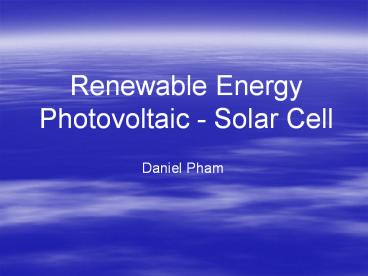Fuel Cell Technology - PowerPoint PPT Presentation
Title:
Fuel Cell Technology
Description:
Renewable Energy Photovoltaic - Solar Cell Daniel Pham Solar Source Drivers for Solar power How Photovoltaic Solar Cell Work Types of Photovoltaic Cell First ... – PowerPoint PPT presentation
Number of Views:174
Avg rating:3.0/5.0
Title: Fuel Cell Technology
1
Renewable Energy Photovoltaic - Solar Cell
Daniel Pham
2
Solar Source
- The average solar power incident on Continental
US is 1600 x 1012 W - This is 500x the power consumption in US (3.3 x
1012 W) - If we cover 2 of the continental US with 10
efficient PV systems, we would make all the
energy we need. - FYI
- 1.5 of Continental US is covered by roads
3
Drivers for Solar power
- 2 billions people without electricity worldwide
- Low cost for remote requirements
- Power line extension costs 10,000 to 30,000
per mile - Reduce peaking loads
- Government subsidies
- Environmental friendly
4
How Photovoltaic Solar Cell Work
p-n junction
Light can be separated into different wavelengths
Only photon has more energy required can
generate electron-hole pair
5
Theoretical Efficiency of Photovoltaic Cell
High band gap PV cell provides higher
voltage Typical efficiency of commercial PV is
around 12
6
Types of Photovoltaic Cell
- First Generation PV Cell
- Single crystalline silicon
- Multi-junction cell (different band-gap
materials) - Second Generation PV Cell
- Thin film silicon (amorphous silicon)
- CdTe (Cadmium Telluride)
- CuInSe2 (Copper Indium Diselenide)
- Third Generation PV Cell
- Ultra-High Efficiency concepts (gt80)
- Ultra-low Cost
- Polymer cells with quantum dots or nanostructures
Carbon nanotube on Si for more efficient solar
power
CdTe rods in polymer
7
Photovoltaic Roadmap
1st Generation PV Crystalline Silicon
2nd Generation PV Thin Film
3rd Generation PV Ultra-High Efficiency Ultra-Low
Cost
Source European Commission meeting Dec. 2004
8
Decline Price of PV
Where is the cost
PV manufacturing cost
- Produce wafer (40)
- Fabricate cell (30)
- Interconnect and laminate (30)
State, federal, utility and other subsidize
combine paying half of the cost
- Installation cost (same as cost of the module)
9
Worldwide PV Growth
Source European Commission meeting Dec. 2004
10
Future Reality ?
If the PV market growth continues at rate of 20
and panel lasts 50yrs, there will be 100 TW of
energy provide by PV cells on the ground
Within 50 years, photovoltaic will supply more
than half of the worlds supply energy
11
Government Policy For Solar Energy
- National Energy Policy Act of 1992
- Using other alternative energy sources by 2010
- Reduce green house gas emission by other
alternative energy sources - Alternative Fuels Initiative (Summer 1998)
- Energy Smart Schools, to cut energy bills in
schools and reinvest the savings in educating the
nation's most valuable resource - our children.
(Solar power panel started installing in schools) - The Million Solar Roofs Initiative, announced in
June, 1997, by President Clinton, to install
solar energy systems on one million rooftops by
the year 2010. - The Energy Policy Act of 2005, the new national
energy law signed by President Bush on August 8,
2005, valuable federal tax credits - Financial Opportunity
- Federal, State and subsidize for consumer
- Grants, Federal funding for manufacturing and
development
12
Conclusions
- Solar power source is abundant
- Many types of PV cells are in development to meet
to PV Roadmap for future needs - PV cells efficiency can be increased and
underdevelopment - Solar power from PV cell are safe and potentially
growing































